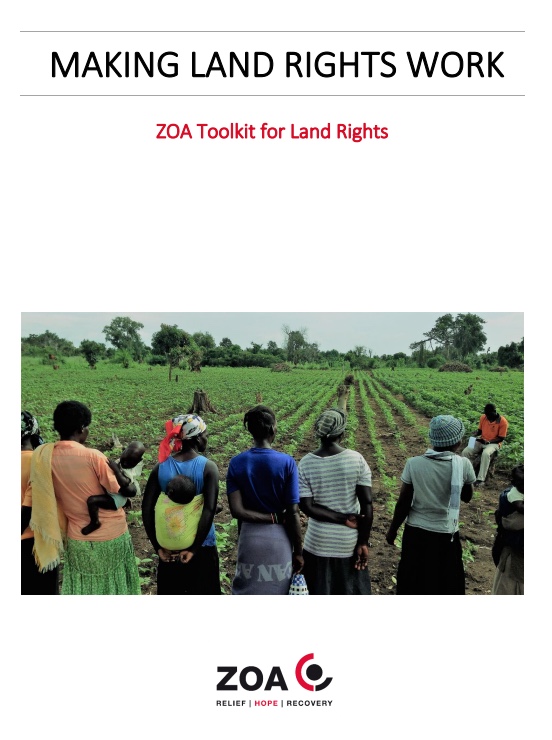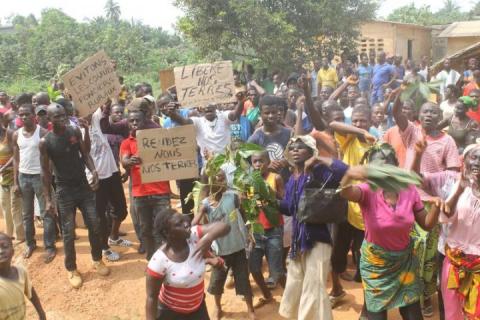
Topics and Regions
Currently working as Sector Specialist Land Rights for ZOA within our Peacebuilding sector. Engaged in project development and support, focusing on integrated approaches to land rights challenges in post-conflict and post-disaster settings. Combining conflict resolution, sustainable forms of land governance, climate smart agriculture and livelihoods work. Supporting projects in Burundi, Uganda, the Democratic Republic of Congo and others. Also representing the organization in international land rights networks and acting as an internal and external knowledge hub.
Doctorate (DPhil) at the Freie Universität Berlin in July 2016. Working on policy analysis and -development, related in particular to land rights as well as more generally development issues.
My doctoral thesis focuses on the Determinants, Consequences and Perspectives of Land Reform Politics in Newly Industrializing Countries looking specifically at the cases of India and South Africa.
Details
Location
Contributions
Displaying 1 - 7 of 7Grabbing land to save the planet? Why we need to safeguard legitimate land tenure rights to stay within 1.5 Degrees and protect biodiversity
This session addressed the fact that the rights implications and the social and economic consequences of current climate change and biodiversity strategies in the context of the Rio Conventions for millions of people are not sufficiently acknowledged, researched, and addressed. The presenters and participants discussed the urgent need to have public, academic and policy debates about the impact of land-based climate and biodiversity strategies on poor communities and the development trajectories of rural economies.
Land Rights Toolkit for NGOs
This toolkit aims to offer concrete tools for practitioners to engage with land rights on different levels. This toolkit intends to offer an introduction to different tools that can be used. Furthermore, the aim is to offer clear guidance on how to implement the tools.
Working in crisis mode: lessons from land-governance interventions in fragile and conflict-affected settings
This session brought together colleagues from different organizations working in the broad field of land rights, discussing lessons and experiences from working in crisis mode, in fragile and conflict affected settings. The participants shared experiences, challenges they faced especially during Covid, the solutions they found and critically reflected on shortcomings and unsolved issues.
Mapping for Peace and Prosperity
This paper engages with innovative ways to apply participatory mapping techniques and the latest technological tools in fragile, conflict-affected settings to contribute to sustainable land use. In this paper, the authors describe in detail the process and purpose of a participatory mapping project in northeastern Democratic Republic of Congo (DRC), and elaborate on the lessons learned so far. The paper concludes with a set of recommendations to take the process forward for greater sustainability and long-term land rights protection.
New threats to resource rights and food security: COVID-19 impact and response
The ongoing pandemic and the formal and informal responses to its spread have very direct impacts on the food and nutrition security of people in all parts of the world. Strong concerns have been voiced that the global health crisis could turn into a global food crisis.
Strengthening local land registration in conflict-affected northern Uganda
The project ‘Grounded Legitimacy’ explored how interventions in land governance by development organizations feed into the legitimacy of state and non‐state public authorities, and how these development organizations may better take ‘legitimacy’ into account. This policy note presents key findings and their implications for policy makers.
Training Manual - Working on Legitimacy in Land Governance
How state and customary authorities deal with land issues has important consequences for how they are viewed by citizens. This may be particularly the case in conflict-affected settings, where displacement and return cause tenure insecurity and land disputes, and where the legitimacy of state and non-state institutions is contested. ZOA and Radboud University have developed a training manual around legitimacy and land, based on research conducted by Radboud researchers in Uganda.





